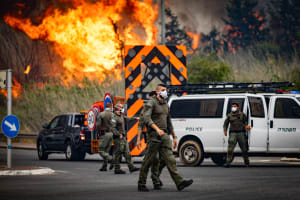US secretary of state begins Middle East visit amid growing Palestinian-Israeli violence
This is Blinken's first official visit to the region since the establishment of the new Netanyahu government in Jerusalem

U.S. Secretary of State Antony Blinken on Sunday began his first official visit to the Middle East since the establishment of the new Netanyahu government in Jerusalem.
Blinken is scheduled to visit Egypt, Israel and the Palestinian Authority. While Blinken is a seasoned diplomat, his upcoming visit to the combustible Middle East comes amid heightened tensions and lethal violence in the region.
This Thursday, nine Arabs, mostly armed terrorists, were killed during a gun battle with Israeli forces during an Israeli arrest operation targeting a Jenin-based Palestinian Islamic Jihad terror cell.
On Friday, International Holocaust Memorial Day, an Palestinian terrorist from Jerusalem’s Abu Tor neighborhood murdered seven civilians outside of a synagogue in Neve Yaakov, an Orthodox Jewish neighborhood in the capital.
In addition, Gaza-based terrorists fired rockets into Israel and the Israeli Air Force responded by bombing terrorist targets in the Strip.
In an interview with the Al-Monitor news outlet, Aaron David Miller, senior fellow at the Carnegie Endowment for International Peace and a former State Department negotiator, said the U.S. administration “clearly understands that with this new government, 1,000 fires can be lit very easily – and the best they’re going to be able to do is put those fires out.”
Miller stressed the need for the Biden administration to facilitate trust between the Palestinian Authority and the Israeli government.
“They need to hew closely to their own talking points, which is to help create an environment between Israelis and Palestinians that is more conducive to building trust,” Miller said. “To do that, they need to set up rules of the road.”
The U.S. State Department said Blinken would discuss with regional leaders “Israeli-Palestinian relations and the importance of a two-state solution, political reforms, and further strengthening the U.S. relationship with the Palestinian people and leadership.”
However, the reality on the ground does not look promising for diplomatic progress anytime soon. On Saturday, the P.A. repeated its threat to end security coordination with Israel and said the U.S. and European Union could not convince them otherwise.
U.S. Assistant Secretary for Near Eastern Affairs Barbara Leaf recently criticized Ramallah’s intention to end security cooperation with Jerusalem.
“Far from stepping back on security coordination, we believe it’s quite important that the parties retain – and if anything, deepen – security coordination,” Leaf said.
Many regional and international observers believe this security coordination is beneficial for both Israel and the P.A.
However, there are also voices on the Israeli side who oppose the current status quo between Ramallah and Jerusalem. Following recent, lethal terror attacks against Jewish Israeli civilians, Israeli Diaspora Minister Amichai Chikli blasted the P.A. as an enemy entity.
“I think that the Palestinian Authority, as of today, is the enemy of the State of Israel. We still do not have any peace agreement with it. It is an enemy entity, an entity that is anti-Semitic to its core, and we need to examine alternatives to it,” Chikli said, during an interview with Ynet news.
“I see the Palestinian Authority as a neo-Nazi entity in its essence and outlook,” the Israeli diaspora minister added and pointed to the endemic anti-Semitism in areas under P.A. control.
“The most anti-Semitic political entity on earth is the Palestinian Authority, in which 93% of the population advocates anti-Semitic positions,” Chikli said.
An Anti-Defamation League report from 2014 also demonstrated that 93% of the P.A. population then harbored anti-Semitic feelings.
Following the mass shooting of Jews and others outside of the Jerusalem synagogue, U.S. President Joe Biden reiterated Washington’s support for Israel and condemned the attack.
“The president made clear that this was an attack against the civilized world,” the White House said in an official statement.
At the same time, Washington is concerned about the Netanyahu government’s planned judicial reforms that critics argue could weaken Israeli democracy.
In addition, the U.S. opposes transferring civilian powers in Judea and Samaria to Israeli Finance Minister Bezalel Smotrich, known for his hardline right-wing positions. Critics warn that the nations could interpret such a move as de facto annexation.

The All Israel News Staff is a team of journalists in Israel.














